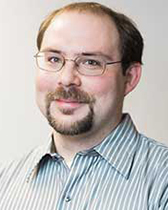
Teaching Faculty Spotlight: Ryan Bethel
Ryan Bethel, an Associate Professor of Instruction, joined the Department in Summer 2022. His research interests and expertise lie in the field of bioinorganic chemistry. His undergraduate students regularly praise him for his accessibility and interesting flipped classroom teaching style.
What drew you to teaching Chemistry?
I never expected to teach growing up. My parents were both teachers, covering every level from elementary to graduate courses. I told myself growing up that I didn’t think it would be for me. However, the ACS chapter at my undergraduate institution offered free tutoring and I volunteered to help. I still remember the first time I explained enthalpy to a freshman. The look of understanding when they “got” it. I was hooked on teaching, and I knew I had to keep at it.
You describe your research interest as being in bioinorganic chemistry. What draws you to that area of chemistry?
The way cells can produce the most intricate molecules imaginable is fascinating. The assembly of iron-sulfur clusters and enzyme active sites requires a collection of proteins, each working in concert to build organometallic compounds that are amazingly similar to the structures we can synthesize in the lab. Synthetic analogues of these enzymes may one day be used to catalyze useful reactions without the need for harsh conditions or expensive reagents.
Tell us something that inspires you in the current students you teach.
Northwestern students are inquisitive in a way that continually surprises me. I love seeing how they can take a new concept and tie it back to something we talked about weeks ago. These students are always asking more questions and working hard to understand what makes the world around them work.
What Chemistry class/professor did you enjoy the most as an undergraduate or graduate student and how did that inspire your teaching?
I had the good fortune to take both General and Physical Chemistry courses from Prof. James McCormick at Truman State University. His classes took me from having an interest in chemistry to having a passion to learn more about the subject. I remember feeling like I could ask him anything about chemistry and that he would be excited to tell me more. My goal is to make my students feel the same. I want them to get excited to hear about the next topic and I want them to come to me with all their questions, not just about homework or exams, but about anything they can think of asking.
What advice do you have for young chemists interested in a career in academia?
I always advise my students to try something first-hand. Chemistry is an experimental science, so test your interest. If you want to give lectures; tutor, TA, and teach as much and as you can as early as you can. If you want to do research, get started today! A quick word of warning though: If you love it, you may find it hard to leave. Academia is a rewarding career and a lifelong passion for every professor I have ever known.
Can you tell us something not on your CV that you would like us to know?
I love learning new things. I will happily pick up a book about history, philosophy, cosmology, or any other subject that I can find. Discovering new things can be just as much fun from a book or an expert as in the laboratory and I am always trying to broaden my horizons.
